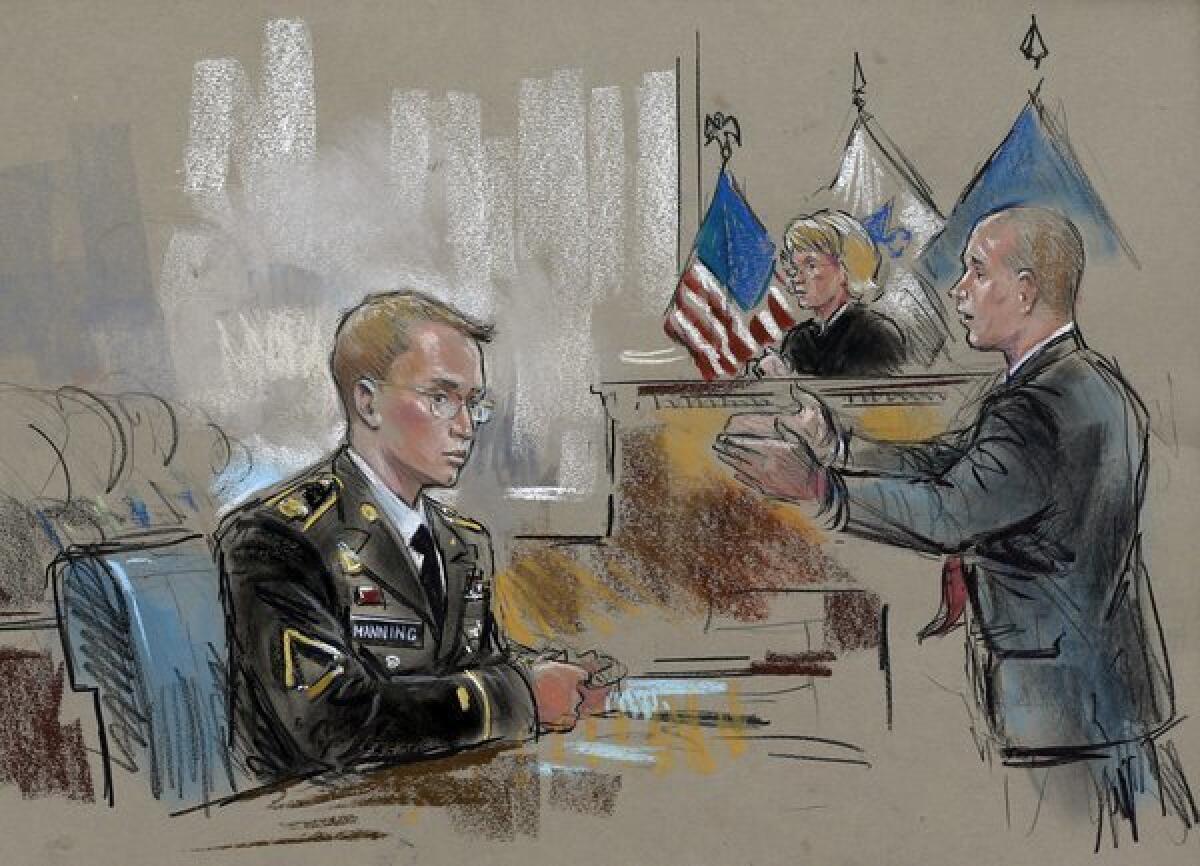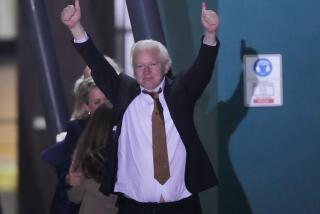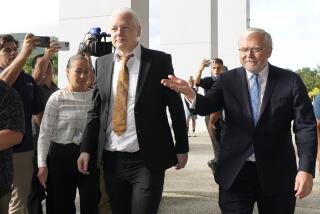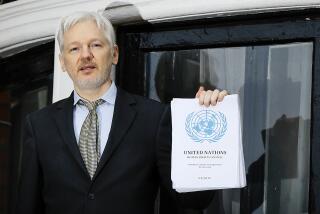Prosecutors look to closely link Bradley Manning and Julian Assange

FT. MEADE, Md. — Government prosecutors seeking life in prison for Army Pfc. Bradley Manning opened his court-martial Monday closely linking the young, nondescript enlistee from Oklahoma with the outsized Julian Assange, head of the anti-secrecy WikiLeaks website who used his world stage to post hundreds of thousands of Manning’s purloined documents in the largest leak of U.S. classified material in the nation’s history.
Army Cpt. Joe Morrow, prosecuting Manning on 21 charges, including endangering the U.S. and aiding the enemy, said Manning downloaded and sent to WikiLeaks more than 700,000 classified materials after the short, bespectacled Manning and the silver-haired media celebrity Assange quietly exchanged personal contact information and crafted Internet chat logs to expose the deepest secrets in the fight against terrorism and the wars in Iraq and Afghanistan.
That partnership, Morrow and other Army prosecutors alleged, blossomed to one where the unlikely pair discussed their own attempts at secrecy even as Manning methodically flipped documents to Assange and the WikiLeaks editor-in-chief routinely posted the material – including State Department cables, assessments of terror captives, prisoner interrogation videos and U.S. evaluations of foreign allies.
“These were massive, massive downloads,” Morrow said. “Packaged and out the door to WikiLeaks in some instances in a matter of minutes.”
He said Manning researched the WikiLeaks website more than 100 times, often because the 25-year-old computer whiz turned soldier was in thrall to the high-profile Assange and his mission to lift the veil off secret government documents.
To demonstrate how smoothly Manning and Assange worked together, Morrow said, “Manning first began helping WikiLeaks” soon after deploying to Iraq in November 2009. He said his first transmission was a password-protected video of U.S. bomb strikes that hit civilians. Less than two months later, he said, Assange tweeted on WikiLeaks that he had obtained the “encrypted video” and then posted it.
But David Coombs, Manning’s chief defense attorney, told Judge Denise Lind, an Army colonel, that there was no special partnership between his client and Assange. Rather, he said, Manning decided to leak documents out of frustration when U.S. soldiers cheered that they had missed being injured in a roadside explosion, even though an Iraqi citizen was killed and four others injured.
“There’s simply no evidence to support that,” Coombs said of any Manning-Assange personal cabal to release materials. “He was not taking his direction from WikiLeaks.”
Manning was arrested more than three years ago. He has since been held in solitary confinement in a military brig, sometimes naked. Likewise Assange sits in a kind of prison of his own, claiming asylum in the Ecuadorean Embassy in London, to avoid extradition to Sweden for questioning on sexual assault allegations as well as fears that Manning’s prosecutors would like to extradite Assange to this country.
But according to Morrow, there was a time when Manning and Assange were so comfortable in their relationship that by May 2010, well into their arrangement, Manning sent a rather flippant email using a personal address of “bradass87.” It apparently was a combination of his first name and Assange’s last, and the year Manning was born, 1987.
He wrote: “If you had unprecedented access to classified networks 14 hours a day 7 days a week for 8+ months, what would you do?”
According to prosecutors, Manning kept feeding Assange.
But Coombs countered that Manning’s decision to release classified documents came in late December 2009, when he was new to Iraq and learned to his horror that a family of five was grievously injured in a roadside bomb attack.
Coombs said that on Christmas Eve that year a vehicle with two adults and three children pulled to the side of the road to let an Army convoy pass, only to hit a roadside bomb. “All five of the occupants were taken to the hospital,” Coombs said. “One died en route.”
What troubled Manning more, Coombs said, was that U.S. soldiers cheered because their convoy missed the hidden bomb. “He couldn’t stop thinking about it.”
He noted that Manning placed the word “humanist” on the back of his dog tags where religions are signified and said the decision to leak material was his, not Assange’s. “He felt he needed to do something, something to make a difference, from that moment forward,” Coombs said. “He started selecting information he believed the public should see and should hear, and that that would make the world a better place.
“He believed if everyone knew it, it could not be used by the enemy. He started to believe this information should be made public. Americans should know what is happening on a day-to-day basis,” Coombs said.
Coombs said Manning gave WikiLeaks a video of two Reuters journalists killed in a firefight because the military was telling their editors the video did not exist. He said Manning released documents on terror captives because the Obama administration did not close the detainee prison on Guantanamo Bay, Cuba, as promised.
“He was hoping to make the world a better place,” Coombs said. “He was 22 years old, he was a little naive. But he was good-intentioned.”
Follow Politics Now on Twitter and Facebook
More to Read
Get the L.A. Times Politics newsletter
Deeply reported insights into legislation, politics and policy from Sacramento, Washington and beyond. In your inbox three times per week.
You may occasionally receive promotional content from the Los Angeles Times.











